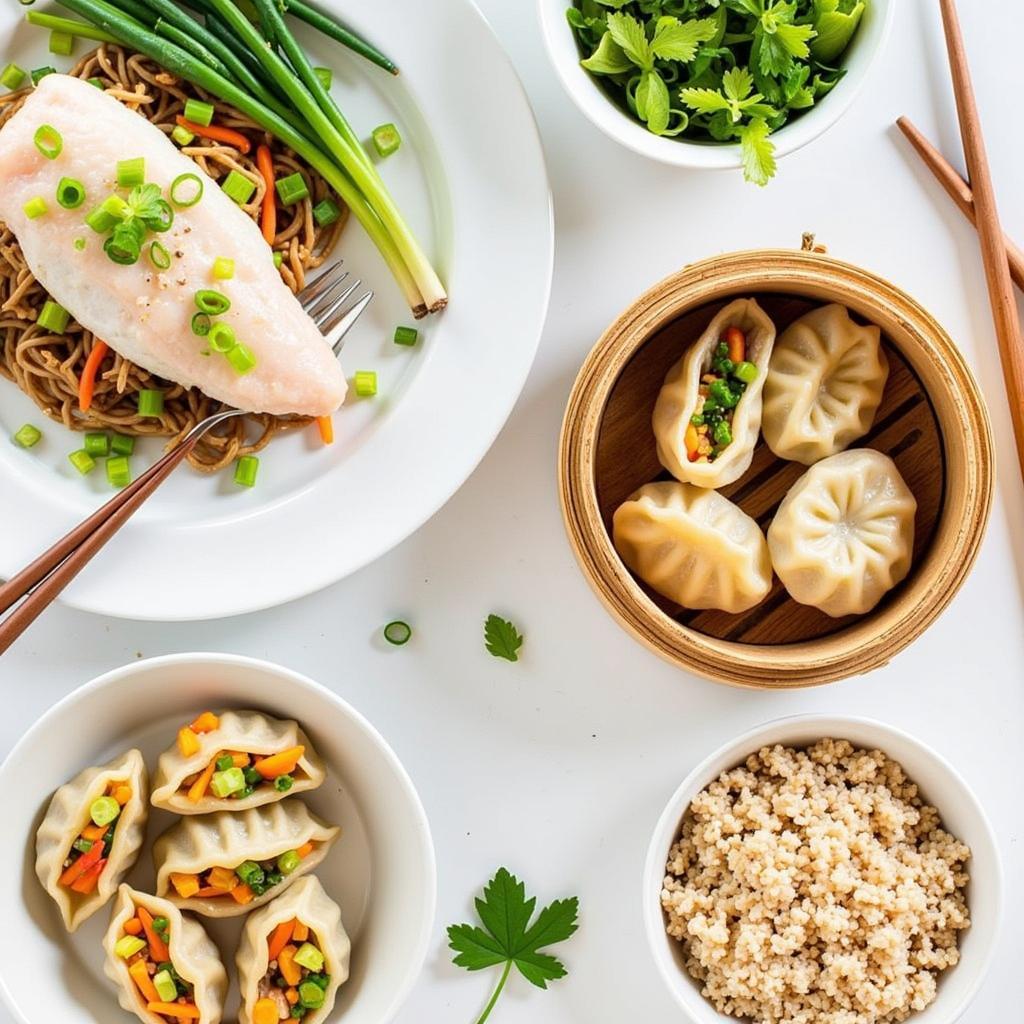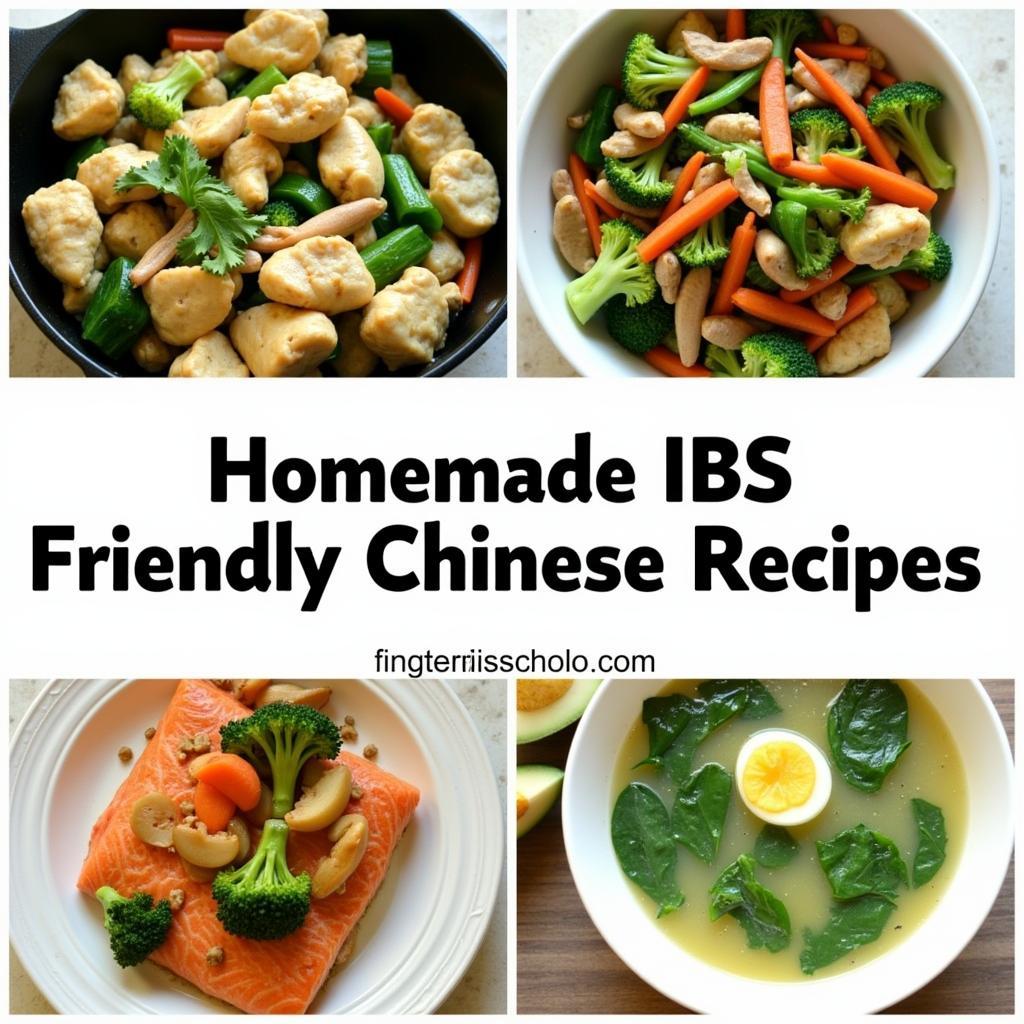Living with Irritable Bowel Syndrome (IBS) can make enjoying your favorite meals a challenge, especially when it comes to flavorful cuisines like Chinese food. But don’t despair! With a little knowledge and careful selection, you can still savor the delights of Chinese Food And Ibs without triggering your symptoms. This guide will help you navigate the menu and enjoy a delicious, IBS-friendly Chinese dining experience. You can even explore options like acupuncture for food sensitivities to further manage your IBS.
Understanding IBS and Chinese Food Triggers
IBS affects the large intestine and can cause a range of uncomfortable symptoms, including abdominal pain, bloating, gas, and changes in bowel habits. Certain ingredients commonly found in Chinese cuisine can be triggers for these symptoms. High FODMAP ingredients, such as garlic, onions, and wheat, are often used in Chinese cooking and can be problematic for those with IBS. Additionally, greasy, fried foods and dishes high in MSG can also exacerbate symptoms.
Understanding your individual triggers is key to enjoying Chinese food with IBS. Keeping a food diary can help you identify which ingredients cause you the most discomfort. Once you know your triggers, you can start making informed choices when ordering Chinese food.
Not sure where to start with IBS-friendly meals? Check out some low FODMAP comfort food ideas.
Choosing IBS-Friendly Chinese Dishes
While some Chinese dishes are loaded with trigger ingredients, many others can be enjoyed without worry. Here are some tips for navigating the menu:
-
Focus on steamed dishes: Steamed vegetables, fish, and dumplings are generally lower in FODMAPs and easier to digest than fried or stir-fried options.
-
Choose plain rice: Avoid fried rice and noodles, which are often cooked with high FODMAP ingredients. Opt for plain white or brown rice instead.
-
Be mindful of sauces: Many Chinese sauces contain high FODMAP ingredients like garlic, onions, and soy sauce. Ask for sauces on the side or request dishes prepared without them. Consider lighter options like ginger and scallion (green onion only) based sauces.
-
Look for dishes with low FODMAP vegetables: Bok choy, spinach, and carrots are all good choices.
-
Communicate with your server: Don’t hesitate to ask about ingredients and preparation methods. Many restaurants are willing to accommodate dietary restrictions.
If you’re looking for Chinese food in Delaware, check out Newark DE. Chinese food options.
 IBS-Friendly Chinese Food Options
IBS-Friendly Chinese Food Options
Managing IBS Symptoms When Eating Chinese Food
Even with careful planning, you may still experience some IBS symptoms after eating Chinese food. Here are some tips for managing them:
-
Drink plenty of water: Staying hydrated can help alleviate bloating and constipation.
-
Take an over-the-counter digestive aid: Enzymes or simethicone can help reduce gas and bloating.
-
Practice relaxation techniques: Stress can exacerbate IBS symptoms, so try deep breathing or meditation.
-
Consider acupuncture: Acupuncture for food sensitivities can help regulate the digestive system and reduce IBS symptoms.
Looking to support local businesses? Consider a sol food gift card.
IBS-Friendly Chinese Recipes to Try at Home
One of the best ways to control ingredients and ensure an IBS-friendly meal is to cook Chinese food at home. Here are some recipe ideas:
-
Stir-fried chicken with bok choy and ginger: Use low-sodium tamari or coconut aminos in place of soy sauce.
-
Steamed salmon with broccoli and carrots: Season with fresh herbs and spices instead of high FODMAP sauces.
-
Egg drop soup with spinach: Skip the MSG and use low FODMAP broth.
 Homemade IBS-Friendly Chinese Food Recipes
Homemade IBS-Friendly Chinese Food Recipes
Are you interested in exploring new food suppliers? Learn more about connect foods.
Conclusion
Enjoying Chinese food with IBS is definitely possible. By understanding your triggers, choosing IBS-friendly dishes, and managing your symptoms effectively, you can still savor the delicious flavors of Chinese cuisine without compromising your digestive health. Chinese food and ibs can coexist peacefully!
FAQ
- What are the most common IBS triggers in Chinese food? Garlic, onions, wheat, and greasy, fried foods are common triggers.
- Can I eat rice with IBS? Plain white or brown rice is generally well-tolerated. Avoid fried rice.
- What sauces should I avoid with IBS? Many Chinese sauces contain high FODMAP ingredients. Ask for sauces on the side or request dishes prepared without them.
- Are there any IBS-friendly Chinese restaurants? Many restaurants are willing to accommodate dietary restrictions. Communicate with your server about your needs.
- What can I do if I experience IBS symptoms after eating Chinese food? Drink plenty of water, take a digestive aid, practice relaxation techniques, or consider acupuncture.
- Can I cook IBS-friendly Chinese food at home? Absolutely! Cooking at home allows you to control ingredients and avoid triggers.
- Where can I find IBS-friendly Chinese recipes? Many online resources and cookbooks offer IBS-friendly recipes.
Need help with food sensitivities? Contact us! Phone: 02437655121, Email: minacones@gmail.com Or visit us at: 3PGH+8R9, ĐT70A, thôn Trung, Bắc Từ Liêm, Hà Nội, Việt Nam. We have a 24/7 customer service team.